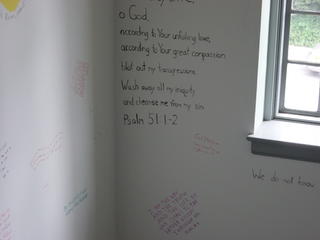Why. A simple word that often requires an exceptionally demanding answer in the face of the deepest soul pain.
Tragedy has been before us, Christian and non-Christian alike. But what do we do with it? Evil has haunted our kind from almost the beginning. Today, we have never been so far from, yet so close to the answer to, the reason for not giving up all hope. In his book, Jesus Among Other Gods, Ravi Zacharias frames the ongoing wrestling match between the peaceful life we all desire, and the stomach-churning realities that many of us face via the ninth chapter of John's gospel. [I encourage you to read his book, even as I quote from it.] Zacharias speaks to the core of the question of why in the face of tragedy and evil.
"Not only is God holy, but He also reveals to us the sacred nature of love, to which He beckons us. And from this sacredness of His love must flow all other loves... The inability to understand the mystery of evil leads to an inability to understand the sacredness of love. A deadly mistake that I believe our cultures make in the pursuit of meaning is this illusion that love devoid of the sacred, a naked love, is all we need to carry us through life's tests and passions. Such love cannot sustain us... In fact, love by itself will make evil more painful. Love can only be what it was meant to be when it is wedded first to the sacred. Sacredness means separateness. Holiness beckons not just to love but moves in increments till it is climaxed in worship. What does all this have to do with suffering? Everything. You see, when the skeptic asks why God did not fashion us so that we would only choose good, he or she completely misses - drastically misses - what goodness is in God's eyes. Goodness is not an effect... But if life is born out of sacredness, neither goodness nor love aloneMy thoughts on this are simple, but, I do not think simplistic. Too many people speak to tragedy and evil from thoughtlessness or self-righteousness. We see that behind the disciples' question to Jesus about the blind man, "Rabbi, who sinned, this man or his parents, that he was born blind?" And this might have actually been one of their more thoughtful questions. But it was one that Jesus was able to speak to in a way that they, nor us, could equivocate. Jesus' answer, in word and deed, shows us how holiness and worship conquer evil. "Neither this man nor his parents sinned," said Jesus, "but this happened so that the work of God might be displayed in his life." Some might choose to see a "sick" kind of god behind such an answer - what kind of god would create or allow a person to be blind so that this god could get some credit? But such a response would miss the issue and the point. Interestingly, sacred and sacrifice share the same root. I think it no mistake that at root here is a truth that it is only when love originates from the sacred, and [that love] is acted upon, that is, expressed sacrificially, that we can answer evil in this world. And that answer is that a sacred sacrifice, that is a life lived for God, is worshiping God in the face of an evil that would seek to persuade or intimidate us into believing that God is either absent or altogether fake.
is the goal. It is reverence, and it must be chosen even when it is hard and costly. This kind of love is a choice to let the sanctity of life dictate the commitment of the will. This kind of reverential love can look upon suffering and see it beyond the clutches of time and through the victory of eternity... We all recognize a sacred love when we see it, and we long for it... Until we understand that kind of love we will never understand why it cannot be programmed. Nor, for that matter, will we ever grasp the true nature of evil. From worship flows this love. That is why God did not make us choose good. It is not goodness we are called to but worship... When that kind of love is expressed to God, every other love finds its cue... Only when holiness and worship meet can evil be conquered. For that, only the Christian message has the answer" (pages 128 - 130).
By reframing our lives so that our view of all whom we know, and all whom we see (that is our neighbors - and who is my neighbor?), as through the framework of Jesus Christ, will we see that all people are created in the divine image of God. When Jesus healed the blind man, it was not to defend the Father from false assertions, but instead to show God's glory at work, that is, how the sacred love of God, through God's people, can meet and overcome evil. We may not see so many miracles like that today (oh that we should), but we can respond to tragedy, suffering, pain, loss, and evil like Jesus did. We can, through such terrible things, display the glory of God, and through that, worship this God who endured evil personally on our behalf. Tragedy is only as defeatable as is our willingness to love and worship a holy God in word and deed.







